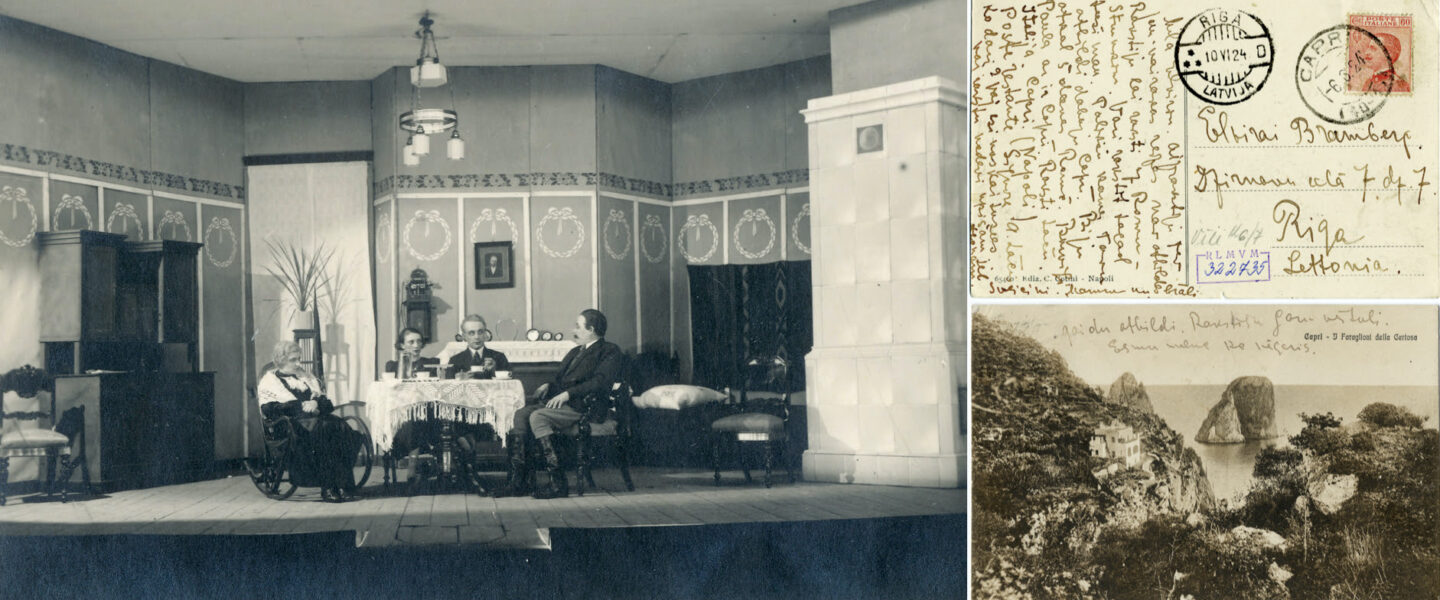
A scene of the play "Women of Niskamäki" by Hella Wuolijoki. The collection of Valga Museum. VaM F 1659:28. Postcard. A. Lācis to E. Bramberga from Capri, 6th of June 1924, where A. Lācis got acquainted with Walter Benjamin. 8.8 x 13.8 cm, courtesy Museum of Literature, Theatre and Music, Riga
EKA, A302
Start Date:
25.03.2024
Start Time:
17:30
End Date:
25.03.2024
Presenters: Jaana Kokko, Andris Brinkmanis
Respondents: Anu Allas, Airi Triisberg
Moderators: Margaret Tali, Ieva Astahovska
The political past, like the present, is often uncomfortable. In this public seminar we will revisit the lives and artistic work of two politically active women in order to rethink how we could open the discomfort their lives introduce and unpack it by focusing on two herstories, those of Hella Wuolijoki (1886–1954) and Asja Lācis (1891–1979). Our aim is to think through how we could turn this discomfort into a starting point. We will inquire whether a comparative perspective on these artists’ lives and works could help shift the view of their left-wing ideas and related engagements, asking how can we reengage with their uncomfortable and marginalized intellectual and creative legacies, allowing for a richer and more complex view of the circumstances and transnational connections. How can we understand and contextualize the discomfort and threats they faced during their careers? Could understanding the connections between their lives and art offer more nuanced and connected ways of grasping, on the one hand, the long and porous 20th century, and on the other, new ways of understanding artistic practice today?
Hella Wuolijoki (born Ella Murrik) was an active figure in Finnish cultural, economic, and political life. Born in Helme in Estonia into an upper-class family in 1886, she moved to Finland in 1904 to study at the University of Helsinki, which had enabled university education for women from 1901. Internationally, Wuolijoki’s most well-known literary work is the play Mr. Puntila and his Man Matti, which she co-authored with Berthold Brecht in 1940. Her autobiographical trilogy, which includes Schoolgirl in Tartu and Student Years in Helsinki, which were written at Katajanokka prison in 1944, where she was held as a traitor. In these texts, Wuolijoki describes violent moments in her parents’ garden in Valga after the 1905 revolution; witnessing the purge that followed sparked her interest in class equality and historical materialism. As an artist Jaana Kokko is particularly interested in this change and the related intense personal experiences.
Asja Lācis (or Anna Lāce) was a Latvian theater director, actress, pedagogue, theorist, tireless seeker, and experimenter who went on to become an intermediary between the German, Latvian, and Russian avant-garde cultures. The topography of her life connects all the focal points of early 20th-century Europe. With her experience, vivid personality, and broad knowledge, she collaborated with and inspired Brecht and Walter Benjamin, among many others. Almost forgotten and sometimes deliberately omitted, the work of Lācis became better known in the west in the 1960s. She is recognized internationally for her innovative work with homeless children as well as for her approach to and methods for working with children’s film and theater, proletarian theater, and amateur actors. She has published German Revolutionary Theater (1935) and Children & Cinema (1928, in collaboration). Lācis’ archival materials, curated by Andris Brinkmanis, were exhibited in Documenta 14 (2017) in Kassel, Germany.
Everyone is welcome to join us and contribute to the discussion!
Jaana Kokko is an artist, filmmaker, and teacher based in Helsinki, whose background is in arts and economics. She is interested in the languages and places/spaces of individuals in which the singularity of experience opens onto the collective and its historicity in ways that allow us to reflect on the ethical, political, and aesthetic dimensions of not only self-representation but also life itself as something shared. Currently, she is working on two films, both located on the peripheries, where she is trying to shift the gaze to the outskirts of the seen and heard.
Andris Brinkmanis is an art critic and curator, born in Riga and based in Brunate and Milan. He is a Senior Lecturer and the Course Leader of the BA in Painting and Visual Arts at NABA in Milan and Visiting Professor for the Art Academy of Latvia Curatorial Course. In 2021, he curated and edited the book Asja Lācis. L’agitatrice rossa. Teatro, femminismo, arte e rivoluzione (Meltemi, 2021).
The seminar and workshop take place in the framework of Communicating Difficult Pasts (2019–2024) and are organized in collaboration of MACA and Institute of Art History and Visual Culture.
